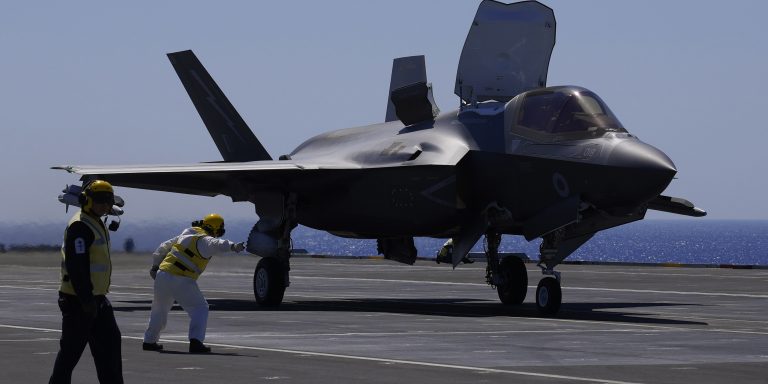INTELBRIEF
December 23, 2021
IntelBrief: UAE Balks at F-35 Purchase as Chinese Influence in Gulf Looms Large

Bottom Line up Front
- A variety of concerns caused the United Arab Emirates (UAE) to suspend talks to finalize its purchase of U.S.-made F-35 Stealth Fighter aircraft.
- UAE officials are balking at the U.S. conditioning the sale on limits to UAE relations with China.
- Broadly, the UAE wants to expand relations with other powers as the United States pivots away from the Middle East to focus on Russia and China.
- The UAE purchase of French-made Rafale combat aircraft represents an effort to prod the United States to drop remaining conditions on the F-35 deal.
The United States and the UAE have encountered roadblocks toward finalizing a January 2021 deal to sell the UAE 50 F-35 Joint Strike Fighter aircraft, as well as MQ-9 “Reaper” armed drones and missiles. The estimated cost of the aircraft alone is approximately $11 billion, and $23 billion overall for all equipment and parts, to include the drones. Despite seeking the advanced aircraft for more than a decade, in mid-December UAE officials announced that they were “suspending” negotiations with the United States to complete the buy, claiming that the Washington was insisting on unacceptable conditions that Abu Dhabi refused to accommodate.
The late-stage problems with the sale could thwart the fulfillment of the UAE’s aim to significantly enhance the capability of its air force, which currently relies on F-16’s. The Obama administration set aside the initial 2010 UAE request to purchase the F-35 in part on the grounds that Israeli leaders asserted that selling the aircraft to the Gulf emirate would erode Israel’s “qualitative military edge” (QME) over its Arab neighbors. U.S. law requires that any arms sale to a regional country not infringe on Israel’s QME. Prompting additional hesitation, some U.S. officials perceived that selling the UAE the most advanced offensive weaponry in the U.S. arsenal would jeopardize negotiations with Iran on nuclear issues.
However, some of these concerns lessened during the Trump administration, which took office six months after Israel received its first F-35. The delivery to Israel gave it a “head start” over any Arab buyer in integrating the F-35 into its force—an additional factor beyond the U.S. equipping Israel’s F-35 with technology superior to that provided to any other non-U.S. F-35 buyer. And, sales of advanced weaponry to the UAE supported the post-2016 U.S. hardline on Iran and the institution of a policy of “maximum pressure” on Tehran. Toward the end of the Trump administration, the UAE was able to link the sale to its participation in the U.S. initiative to broker a normalization of relations between Israel and the UAE and Bahrain. The normalization was signed as the Abraham Accords in September 2020. The normalization deals helped alleviate remaining Israeli and U.S. congressional concerns about the potential of the F-35 sale in eroding Israel’s QME.
In 2021, despite a policy shift back toward engagement with Iran and a formal “review” of the F-35 sale to the UAE, the United States has sought to finalize the F-35 sale. Still, every U.S. sale of advanced weaponry, no matter the buyer, imposes requirements on the end user. The United States has sought assurances that the UAE’s expanding relations with China will not enable China to access or compromise the F-35 technology, once delivered to Abu Dhabi. In explaining their suspension of the deal, UAE officials reportedly have cited U.S. insistence that the UAE limits its relations with leading China telecommunications network firm Huawei on 5G and other technology, and undertake other security safeguards against China. In November 2021, in response to U.S. concerns, the UAE ordered China’s construction of a facility at the UAE’s Khalifa port halted, even though UAE officials disputed U.S. analysis that China planned to use the facility for military purposes. UAE officials have complained in recent weeks that they do not want the F-35 sale—and the UAE more broadly—to become embroiled in the middle of ongoing great power competition between the United States and China.
Yet, many experts assert that the roadblocks to finalizing the F-35 deal go beyond U.S. concerns about China and instead reflect broader UAE doubts about U.S. commitment to Gulf security. The UAE and other Gulf states assert that the Gulf is declining as a U.S. priority, citing: the resumption of U.S.-led talks with Iran to restore the 2015 multilateral Iran nuclear deal; the U.S. withdrawal from Afghanistan; the transition of the U.S. mission in Iraq at the end of 2021 to advise and support only; and the U.S. redeployment of several Patriot missile defense batteries from Gulf countries to Asia. In recent years, the UAE and other Gulf states have sought to broaden their defense relationships beyond the United States, including through purchases of defense equipment from Russia.
In December, perhaps in part to develop leverage in ongoing negotiations over the F-35, the UAE finalized a deal under discussion for more than a decade to buy 80 advanced Rafale combat aircraft from France. The UAE suspension of talks to finalize the F-35 buy, coupled with the Rafale purchase, apparently instilled urgency in U.S. officials to resolve outstanding issues with Abu Dhabi. On December 15, Secretary of State Antony Blinken stated, “We remain prepared to move forward [on the F-35 deal]…if that is what the Emiratis are interested in doing.” Even if all immediate U.S. and UAE concerns on the F-35 sale are resolved, the UAE and other Gulf states are certain to continue expanding their engagement with other major powers in order to diversify their alliances against an Iran that is advancing technologically—while at the same time talking with Tehran to lower tensions. The Gulf leaders apparently recognize that, based on recent trends in U.S. politics and policy, they are not likely to be reassured about the duration and extent of U.S. commitment to Gulf security.